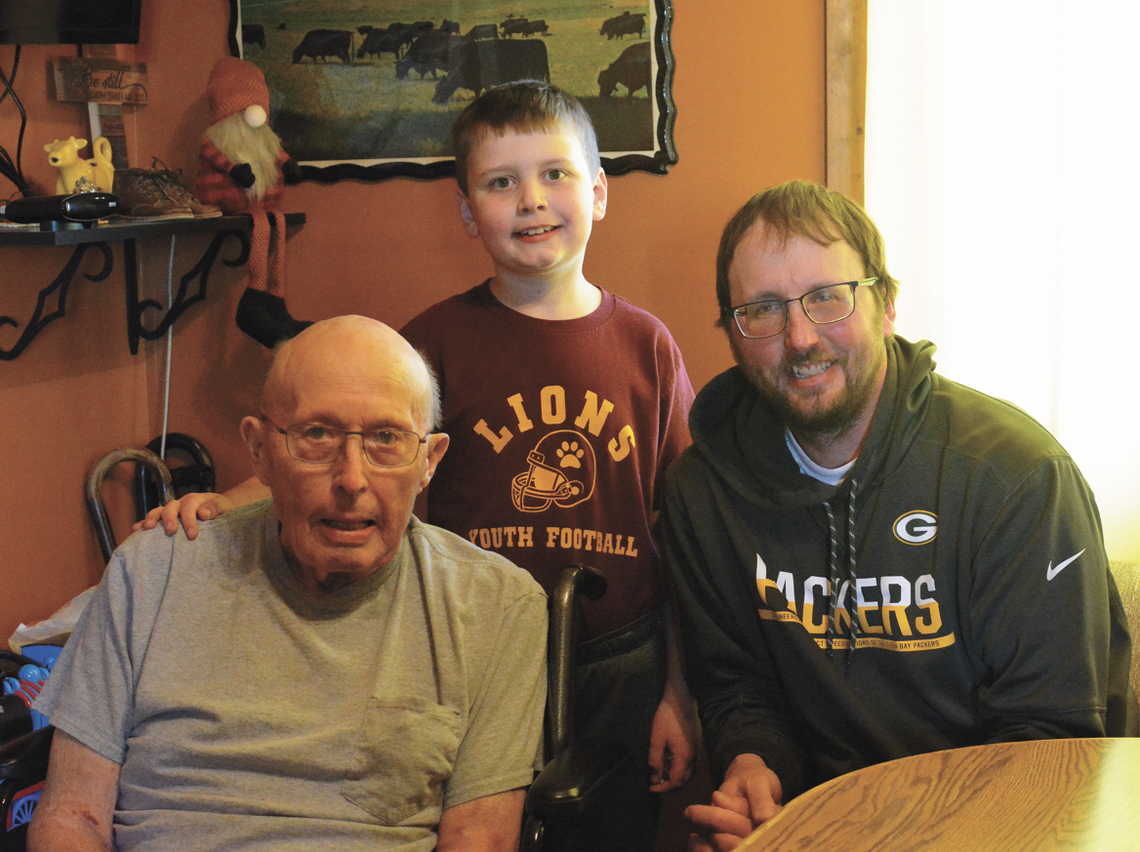If you were to Google ‘What is National Ag Week?’, it would spit back that ‘Ag Week is a time to bring public awareness about Agriculture’s vital role in providing sustainable food supply, creating job
opportunities, and contributing to our nation’s overall economic stability.’ Now, most of us here in South Dakota already know how important agriculture is for our state and nation, so instead of bringing you facts and statistics, Calee Hagen visited with some local farm families to celebrate Ag Week.
Just outside of Pierpont sits the 142 year old Cameron Family Farm. Two houses sit beside each other alongside the highway. One home is for Joe and Kaye Cameron, the other for their son Brett and his family of four.
When I knocked on the door I was greeted by a huge gray Labrador, his age showing in his face. I would later find out his name is Lambeau, in reference to Lambeau Field in Wisconsin. Brett is a tried- and-true Packers fan. Kaye greeted me with a smile and a ‘come on in!’ Seated at the table was her husband, Joe Cameron, an 80-year-old farmer, ready to tell all his stories and thoughts about his many years of farming.
Joe was born in 1943, graduated from high school, attended two semesters of college, and served in the National Guard. His farming career, however, proved to be his most loved endeavor. For 55 years Joe has cared for the land his grandpa and dad passed down to him. He recalls milking the eight to ten cows they owned every day, by hand, and then hauling that milk to town in bottles, to sell at the local store. When his father took over the farm, they continued to milk the cows, but would separate the cream,
putting it in cream cans and trading it for groceries in town every Saturday.
When asked about the biggest difference between then and now, Joe likes to remind his son about how they had to clean out their barn. “With pitchforks and wheelbarrows. It’s all we had. We had to borrow a loader from the neighbors once a year to push the manure away from the barn.”
Planting looked gravely different back then as well. Joe’s dad owned a two row corn planter they used for many years. Planting anywhere between 100 to 150 acres with it. The dryest and toughest year for his family was 1957. The wheat barely grew that year, and his father had to buy hay for the cows. He can easily remember 1972 being one of the ‘better years’ for prices and harvest. “Wheat was $2 per bushel,” he said with a smile. “The expenses weren’t so high, so that year we made nicer profit.”
“I tell young people, the price is insignificant on what you get. It’s a ratio between what you get and what it costs you do produce it.’ stated Joe.
One cherished memory he shared was ‘always having his birthday cake in the field’. His birthday being August 2 nd . They would always be harvesting wheat at that time. His mom would bring it out, and they would all take a break to enjoy his birthday cake!
Joe talked about all the changes he has seen, not just in prices and expense, but in the way farming is done. He used to fall plow everything for ten years. Then he started doing research on chisel plows and decided that was the way to go. And now they have gone to strip tilling. He stated that “all these new advances help because they take way less time.”
Brett Cameron, the youngest of four children, started driving tractors in junior high, helping his dad in the fields as well as feeding cattle. Brett is a Langford High School graduate, he too attended college for a few semesters, and ultimately decided that the family farm held his heart, and in 2008 he returned to start his own family.
He and his wife Denise have now taken over the farming side of the operation, as well as the cow/calf operation. Hollis who is eight and Ivy who is five, will be the sixth generation of Cameron’s to own the land.
Brett says his dad took to advances in technology well. It wasn’t easy for him to accept an auto steer program for the tractor, but once he got the hang of it, he found it to be quite nice, and helpful! We all had a good laugh about a story Brett shared, “Dad called and said, ‘This auto steer is not working, I can’t get the planter to raise or lower!’ So I said I’d come out there. He had the hydraulic locked down on the planter.’ Joe replied to that story, “I thought maybe I’d get fired that day, but after 55 years, I haven’t been fired yet!”
I asked Joe, “What’s one piece of advice you would give to Brett?” He responded “I always say, don’t ever sell the land. If you can’t make it work, and you’re losing money, then just rent it out, but don’t ever sell it.”
Brett says he will carry that advice onto his children as well. He stated “Hollis will probably have the latest robotic tractor out there farming the fields, and Ivy will have the pastures full of horses. She’s been begging for a horse since she learned how to talk.”
It is safe to say Cameron land will always be Cameron land. Whether robots are farming it, or Ivy has 1,000 head of horses running free, Cameron ground will always be a legacy.



